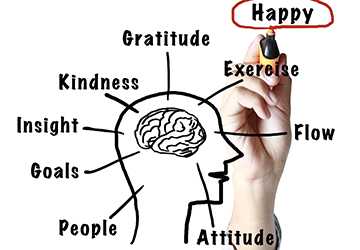The link between happiness and health has long been a subject of interest, and scientific research continues to shed light on the intricate connection between our emotional well-being and physical health. Numerous studies have explored the impact of happiness on various aspects of the body, from the immune system to cardiovascular health. In this exploration, we delve into what science says about the connection between happiness and health and how fostering positive emotions may contribute to overall well-being.

1. The Immune System and Happiness:
Scientific research suggests a bidirectional relationship between happiness and the immune system. Positive emotions, such as happiness and joy, have been associated with a more robust immune response, while chronic stress and negative emotions may compromise immune function.
Key findings on the immune system and happiness:
● Increased antibody production: Positive emotions have been linked to higher antibodies, which play a crucial role in immune defence.
● Enhanced immune cell activity: Happiness may boost the activity of immune cells, including natural killer cells that target infected or cancerous cells.
● Faster recovery: Happier individuals may experience faster recovery from illnesses and surgery than those with lower well-being levels.
2. Cardiovascular Health and Happiness:
The relationship between happiness and cardiovascular health is a growing area of research. Positive emotions can have a protective effect on the heart and may contribute to better cardiovascular outcomes.
Scientific insights on cardiovascular health and happiness:
● Lower risk of heart disease: Happier individuals may have a reduced risk of developing heart disease, including conditions like coronary artery disease.
● Improved heart rate variability: Positive emotions have been associated with better heart rate variability, a marker of cardiovascular health.
● Blood pressure regulation: Happiness may play a role in maintaining healthy blood pressure levels.
3. Pain Perception and Happiness:
Research has explored the relationship between happiness and the perception of pain. While pain is a complex and subjective experience, positive emotions have been found to influence how individuals perceive and cope with pain.
Scientific findings on pain perception and happiness:
● Reduced pain intensity: Happier individuals may report lower levels of pain intensity in various conditions.
● Improved pain tolerance: Positive emotions may enhance the ability to tolerate pain and discomfort.
● Enhanced pain coping mechanisms: Happiness has been linked to healthier coping strategies in individuals dealing with chronic pain conditions.
4. Longevity and Happiness:
Several studies have investigated the potential impact of happiness on longevity. While the relationship is multifaceted and influenced by various factors, evidence suggests that positive emotions may contribute to a longer and healthier life.
Scientific insights on longevity and happiness:
● Longer life expectancy: Some research indicates that individuals with higher happiness and life satisfaction tend to live longer.
● Reduced mortality risk: Happiness has been associated with a lower risk of premature death from various causes.
● Healthier ageing: Positive emotions may contribute to healthier ageing, including better cognitive function and physical well-being.
5. The Brain and Happiness:
Neuroscientific studies have explored the neural mechanisms underlying happiness and its impact on the brain. Positive emotions are associated with brain structure and function changes, influencing various cognitive processes.
Neuroscientific findings on the brain and happiness:
● Brain structure changes: Regions of the brain associated with emotional regulation, such as the prefrontal cortex, may exhibit structural changes in response to positive emotions.
● Neurotransmitter release: Happiness is linked to the release of neurotransmitters, including dopamine and serotonin, which play critical roles in mood regulation.
● Cognitive function: Positive emotions have been associated with improved cognitive function, including enhanced creativity and problem-solving abilities.
6. Behavioral Factors and Health:
The connection between happiness and health extends to lifestyle and behavioural factors. Happier individuals tend to engage in healthier behaviours, which, in turn, contribute to overall well-being.
Behavioural aspects of happiness and health:
● Physical activity: Happy individuals are likelier to engage in regular physical activity, promoting cardiovascular health and overall fitness.
● Healthy eating habits: Positive emotions are associated with better food choices, including a preference for nutritious and balanced meals.
● Reduced substance abuse: Happier individuals may be less inclined to engage in harmful behaviours such as smoking or excessive alcohol consumption.
7. Social Connections and Happiness:
The quality of social connections and relationships significantly contributes to happiness and health. Positive social interactions can foster emotional well-being and provide a buffer against stress.
Scientific insights on social connections, happiness, and health:
● Reduced stress response: Positive social interactions can mitigate the body's stress response, influencing hormones such as cortisol.
● Improved mental health: Strong social support is associated with lower rates of depression and anxiety, contributing to overall mental well-being.
● Enhanced resilience: Positive relationships can enhance resilience, helping individuals cope with life's challenges.
8. Mind-Body Interventions and Well-Being:
Mind-body interventions, such as meditation and mindfulness practices, have gained attention for their potential impact on happiness and health. These practices involve cultivating present-moment awareness and promoting a positive mental state.
Research on mind-body interventions and well-being:
● Stress reduction: Mindfulness-based practices have been shown to reduce stress levels, promoting emotional well-being.
● Improved mood: Regular meditation is associated with improvements in mood, including increased feelings of happiness and contentment.
● Positive physiological changes: Mind-body interventions may influence physiological processes, such as reducing inflammation and promoting relaxation.
9. Coping with Adversity:
Happiness and well-being depend not solely on life circumstances but also on one's ability to cope with adversity. Resilience, or the capacity to bounce back from challenges, is crucial in maintaining happiness and overall health.
Scientific insights on resilience and well-being:
● Adaptive coping strategies: Happier individuals tend to employ adaptive coping strategies when faced with adversity, contributing to better mental health.
● Emotional regulation: Positive emotions are linked to effective emotional regulation, enabling individuals to navigate life's challenges easily.
10. Caveats and Considerations:
While research suggests a strong connection between happiness and health, it's essential to acknowledge the complexity of these relationships. Individual factors, genetic predispositions, and life circumstances all shape happiness and health outcomes. Moreover, the definition of happiness varies among individuals, encompassing a range of emotional experiences and life satisfaction.

Conclusion:
The scientific exploration of the connection between happiness and health highlights the profound impact of positive emotions on various aspects of well-being. From immune system function to cardiovascular health and even pain perception, the benefits of happiness are far-reaching. Cultivating happiness through positive social connections, mind-body interventions, and adaptive coping strategies contributes to emotional well-being, physical health, and longevity. As research continues to uncover the intricacies of this relationship, integrating strategies to enhance happiness may emerge as a valuable component of holistic health promotion and disease prevention. Ultimately, fostering happiness becomes not only a pursuit of emotional fulfilment but also a proactive approach to nurturing a healthier and more resilient body.
11. Practical Tips for Cultivating Happiness:
Given the evidence of the positive impact of happiness on health, incorporating practices to enhance well-being becomes a meaningful endeavour. Here are practical tips based on scientific insights:
● Practice gratitude: Regularly expressing gratitude has been associated with increased happiness and life satisfaction. Consider keeping a gratitude journal to reflect on positive aspects of your life.
● Engage in meaningful activities: Pursue activities that align with your values and provide a sense of purpose. Engaging in meaningful endeavours contributes to a more fulfilling and satisfying life.
● Cultivate social connections: Foster positive relationships with friends, family, and community. Meaningful social connections are a cornerstone of both happiness and mental well-being.
● Prioritize self-care: Attend to your physical and mental well-being through self-care practices; this includes getting adequate sleep, engaging in regular physical activity, and practising stress-reducing activities.
● Mindfulness and meditation: Incorporate mindfulness practices into your routine. Mindfulness meditation has been shown to reduce stress, enhance emotional well-being, and contribute to overall happiness.
● Seek professional support: If facing challenges that impact your happiness, consider seeking support from mental health professionals. Therapists and counsellors can provide guidance and strategies to navigate difficulties.
12. The Role of Positive Psychology:
Positive psychology, a field dedicated to studying positive emotions and well-being, has significantly advanced our understanding of the connection between happiness and health. Researchers in positive psychology explore interventions and practices that promote positive emotions and contribute to a flourishing life.
Fundamental principles of positive psychology:
● Focus on strengths: Positive psychology emphasizes identifying and leveraging individual strengths to enhance well-being.
● Promote positive emotions: Strategies to cultivate positive emotions, such as joy, gratitude, and love, are central to positive psychology interventions.
● Encourage life satisfaction: Positive psychology interventions often aim to improve overall life satisfaction by fostering a sense of purpose and fulfilment.
13. Individual Differences and Subjectivity:
Acknowledging that individual differences and subjectivity influence the relationship between happiness and health is essential. What brings happiness to one person may differ from another, and the impact of positive emotions can vary based on personal factors and life circumstances.
Considerations regarding individual differences:
● Genetic factors: Evidence suggests that genetic factors play a role in shaping individual happiness levels. Some individuals may be predisposed to experiencing higher or lower levels of happiness.
● Life circumstances: While positive emotions contribute to well-being, life and external factors can influence happiness. Recognizing and navigating challenges while working to enhance positive emotions is crucial.
● Cultural influences: Cultural norms and values shape the perception of happiness, and individuals from different cultures may prioritize and experience happiness in diverse ways.
14. Integrating Happiness into Healthcare:
As the understanding of the happiness-health connection grows, there is an increasing recognition of the importance of integrating positive psychology principles into healthcare practices. Some healthcare professionals are exploring ways to incorporate interventions that promote positive emotions and well-being.
Potential areas of integration:
● Health promotion programs: Incorporating positive psychology interventions into health promotion initiatives can enhance overall well-being and preventive health measures.
● Patient-centered care: Considering the individual's emotional well-being and life satisfaction as integral components of patient-centred care.
● Stress management: Integrating strategies to promote positive emotions as part of stress management programs and interventions.
15. Future Directions in Research:
The field of happiness and health continues to evolve, with ongoing research exploring new dimensions of this intricate relationship. Future studies may delve into the impact of specific positive emotions, the role of cultural variations, and the long-term effects of happiness interventions.
Potential areas for future research:
● Neurobiology of happiness: Advancing our understanding of the neural mechanisms underlying the impact of positive emotions on the brain and body.
● Longitudinal studies: Conducting longitudinal studies to examine the long-term effects of sustained happiness on health outcomes and longevity.
● Cultural perspectives: Exploring how cultural variations influence the relationship between happiness and health and tailoring interventions to diverse cultural contexts.
Conclusion:
The scientific exploration of the connection between happiness and health significantly advances our understanding of human well-being. As research continues to unveil the intricate relationships between positive emotions and various aspects of physical and mental health, there is a growing recognition of the importance of fostering happiness as a proactive approach to holistic health.
While happiness alone may not be a panacea, its positive impact on immune function, cardiovascular health, pain perception, and overall well-being underscores its relevance in pursuing a healthier and more fulfilling life. Integrating evidence-based strategies for cultivating happiness into daily life, healthcare practices, and public health initiatives holds the potential to contribute to a society where well-being is valued and actively nurtured. As we navigate the complexities of life, the pursuit of happiness emerges not only as a personal aspiration but also as a collective endeavour with far-reaching implications for individual and societal health and flourishing.



